My Drug Period
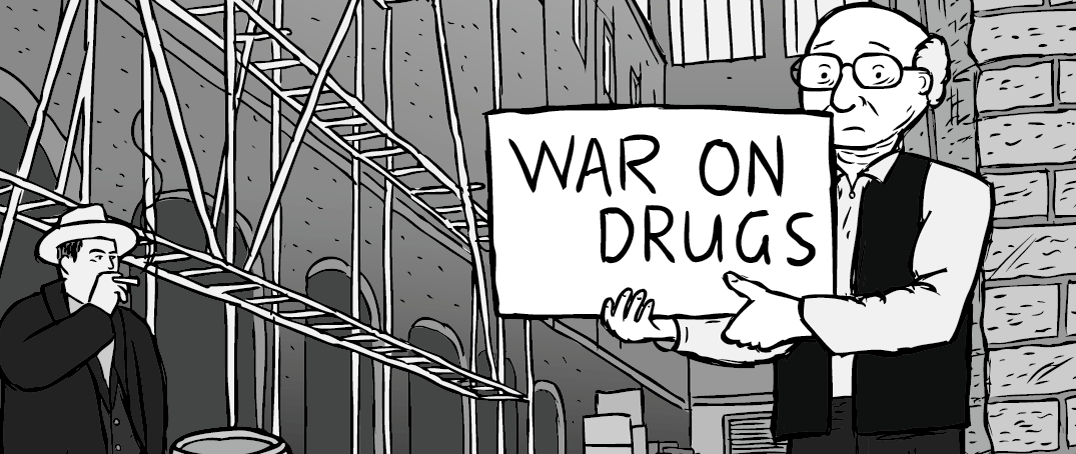
By ‘drug period’, I refer to the 12 months I spent researching, writing and drawing War on Drugs and Rat Park. Prior to those comics, I had written comics mostly about ecology and the natural environment.
War on Drugs and Rat Park are two comics that I hope readers will absorb together. They are both about the topic of ‘drugs’, yet they approach the issue from very different perspectives.
With these two comics, I have examined three issues relating to drugs which are far from the mainstream radar:
Issue 1) Drug laws
War on Drugs looks at the laws that we use to try and stop people from taking drugs. By drawing parallels with alcohol prohibition, it shows the futility of criminalising drugs, and how well-intentioned laws can counter-intuitively make problems worse.
In a way, trying to stop drug use with prohibition laws is like trying to stop teenage pregnancy with laws requiring universal abstinence.
Total prohibition will never work, which is why we should instead adopt a harm minimisation approach, which respects the dignity of people who use drugs and focuses on their safety. That was our approach when deciding how to minimise teenage pregnancy and STIs. By providing a range of options, we make life safer for those who may not live up to ‘ideal’ community standards of reproductive behaviour.
There are few people today, in 2013, who would look back on 1920s alcohol Prohibition as a golden period which we should return to. Yet living within the current era of drug laws, we fail to see the insanity of the modern age of prohibition.
I deliberately chose the 1920s Prohibition analogy as my centrepiece in War on Drugs. Prohibition was an unpopular and unsuccessful experiment attempt to ban alcohol sales, which flew in the face of human nature. By making the comparison with Prohibition, I invite readers who might otherwise support status-quo drug laws to question their beliefs.
The only reason we gravitate towards keeping our current drug laws is a mindset that drugs should be locked away, and drug users punished for their sins.
It sickens me to think about the people who supposedly take the ‘moral high ground’ when defending drug prohibition. Particularly when they emphasise the risks involved in drug-taking such as ‘you don’t know what you’re getting when you buy drugs’, or ‘you don’t know how much you’re taking when you use drugs’.
These extremists would rather see drug-takers die from overdoses so that they can serve as warnings to others. They don’t realise that most of the risks of drug-taking are products of the current black market that they defend. For contrast, compare the consumer information available on bottles of alcohol, describing exactly how many ‘standard drinks’ are contained within, and information about where the drink was manufactured. There is no reason why the same safety information could not be extended to other drugs if legalised.
With the War on Drugs costing $70-105 billion per year to administer in the USA alone, it is time we tried a saner approach. Thankfully the examples of other countries, notably Portugal, show what can happen if drugs are decriminalised. The sky didn’t fall, as critics feared. Quite the opposite: many positives came from drug decriminalisation in Portugal.
For those interested in learning the source of my passion for this issue, read A Small Book About Drugs (2011) by Australian writer Lisa Pryor. Reading it at Easter 2012 was a turning point for me. Lisa managed to link together many ideas which had previously been held separate in my mind. Written with a clear, balanced, incisive style, her work is extremely readable: I devoured it in a day. Then I read it again, taking notes.
Issue 2) Drug addiction
In contrast to the ‘drug laws’ focus of War on Drugs, Rat Park is about the science of drug addiction.
In some ways, drug addiction is the fear at the heart of drug prohibition laws. The fear is that drugs have such worrying potential for addiction that they should be made illegal so that no one can ever try them.
This conception seems to linger even with those who advocate decriminalisation and legalisation of drugs like cannabis. The argument being that cannabis and MDMA are non-addictive ‘soft drugs’, as opposed to ‘hard drugs’ like heroin and cocaine, whose inherent chemical properties lead to addiction. In other words: addiction is a biochemical consequence of an individual taking certain drugs.
My view of the issue was challenged when learning about the SFU Rat Park experiments. Of course, these experiments used rodents as subjects, and can’t be applied to human addictions. So I read more of Bruce Alexander’s research, including his recent book The Globalization of Addiction, which is about addiction in humans. Prof. Alexander dedicates an entire chapter of the book to countering what he calls the ‘demon drug myth’: that drug addictions are automatic consequences of the chemicals themselves. They use the same arguments of the old ‘demon rum’ myth which presented liquor as somehow different to beer and wine. The next two paragraphs are examples from Chapter 8 of Bruce Alexander’s book.
During the Vietnam War, many US soldiers tried heroin, with 19% of the deployment becoming addicted to the drug. However 88% of heroin-addicted soldiers were able to return home without any sort of relapse within their first 3 years on American soil. The change of environment (returning home from the stress of life as a wartime serviceman) was enough to allow them to simply stop taking the drug without suffering from psychological dependence or physiological withdrawal symptoms. [source]
Another example which contradicts the biochemical explanation for drug addiction comes from the British medical system. United Kingdom doctors regularly prescribe heroin as treatment for patients with various medical problems such as chronic pain, childbirth, coughs and diarrhoea. This practice even extended to paediatric patients. In 1972 alone, national prescriptions totalled 29 kilograms of pure heroin: the equivalent of 7 million 4mg injections. These patients were able to complete their hospital treatment and resume normal lives evidently without addiction, cravings or withdrawal symptoms. [source]
If a biochemical explanation for addiction was true, all the rats in the “breaking the habit” Rat Park experiments should have compulsively taken drugs at the same rates.
If the biochemical explanation for addiction was true, 100% of Vietnam vets should have suffered withdrawal symptoms, once their access to heroin ended in America. And 100% of British hospital patients given heroin (including paediatric patients) for pain relief should become addicted through exposure.
But they didn’t, and so the truth must lie elsewhere. Biochemistry is likely part of the answer, but these examples suggest that there are other factors at work.
Understand: I am not denying that certain drugs lend themselves to addictions. Alcohol, heroin and methamphetamines seem to be examples of drugs with properties that allow users to dull reality and escape their troubles, albeit temporarily. However, if the drugs themselves are truly the ’cause’, then by definition everyone who tries these substances should become equally addicted. And that is simply not the case.
I’m not an expert in the field of addiction. While I feel able to criticise the biochemical conception of addiction through force of logic, I am not the person qualified to assess the true cause of addiction.
A worthy place to seek a better answer is Bruce Alexander’s heavily-referenced, yet very readable The Globalization of Addiction. I discuss the premise of his research in my blog post The post-Rat Park research of Bruce Alexander.
Issue 3) Drugs as both ‘good’ and ‘bad’
Perhaps the biggest taboo of all was the one I touched upon in the final 5 pages of War on Drugs. At this point of the story I deviated from the ‘Al Capone and Milton Friedman’ theme and put in a little piece of personal commentary. I said:
“It’s true that drugs can consume and ruin lives…
…but drugs can also provide fun, positive experience.”
Overall the comic was positively received and got a lot of traffic from websites like reddit and Facebook. But despite near-universal support for my central point that drugs should be legalised, some people objected to me mentioning drugs in a positive light and ‘sending the wrong message’.
It seemed that some people, who held progressive views about drug decriminalisation, still could only imagine drugs in terms of addiction and compulsive drug-taking. These people could only imagine drug use as a ‘problem’ which must be minimised. To them, all people who take drugs have horrible experiences and do so against their will.
As a cartoonist who likes to tackle unpopular issues, this attitude intrigued me: that people with otherwise sensible opinions about drugs could have this massive blind spot.
Could this be a hangover of the detached way academics, journalists and politicians discuss drug use? Almost always they are framed as an issue for ‘other people’. It’s simply not proper to admit to personally taking drugs (let alone enjoying the experience).
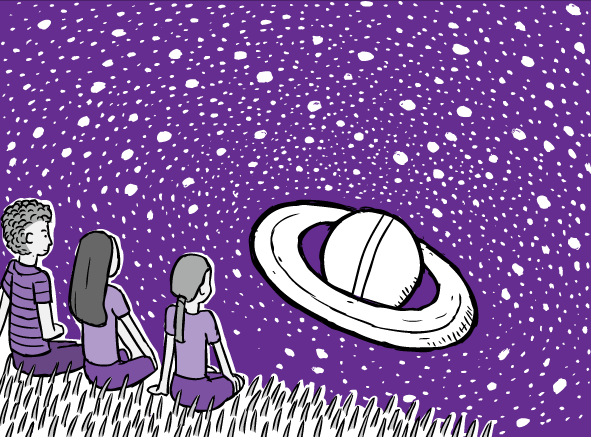
Although I joked about the ‘my drug period’ reference in the title of this essay, this is not a topic I will simply laugh off.
Without making too big a deal of it, the reality is that I have used drugs in the past, and I will definitely use drugs again in the future.
In a separate blog post I discuss my personal drug use history for the first time. I will let this piece speak for itself.
Future comics:
With my two comics War on Drugs and Rat Park now published, I intend to move away from the ‘drugs’ topic and get back to writing about ecology, economics and consumerism. I’m not sure how much more I can write about drugs that I haven’t already covered in those two comics, and in blog posts like this.
Then again, I once thought Part of Nature would be my definitive statement on environmentalism, and that I would never have to revisit that topic. How wrong I was!








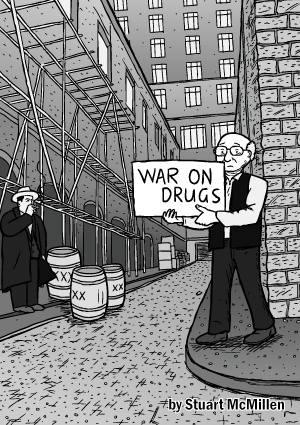
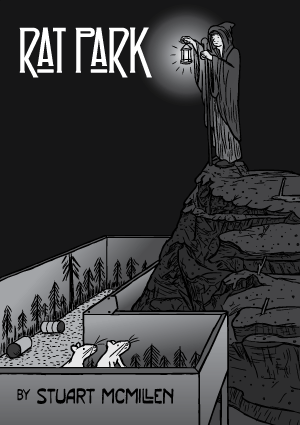
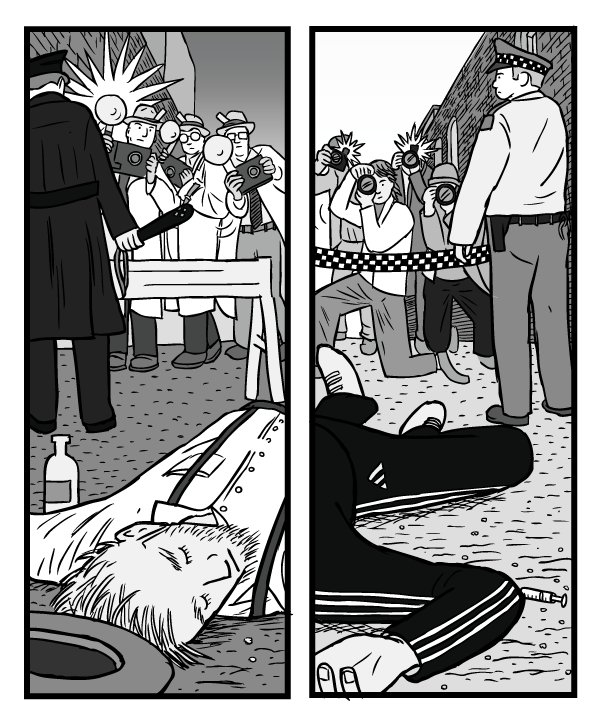
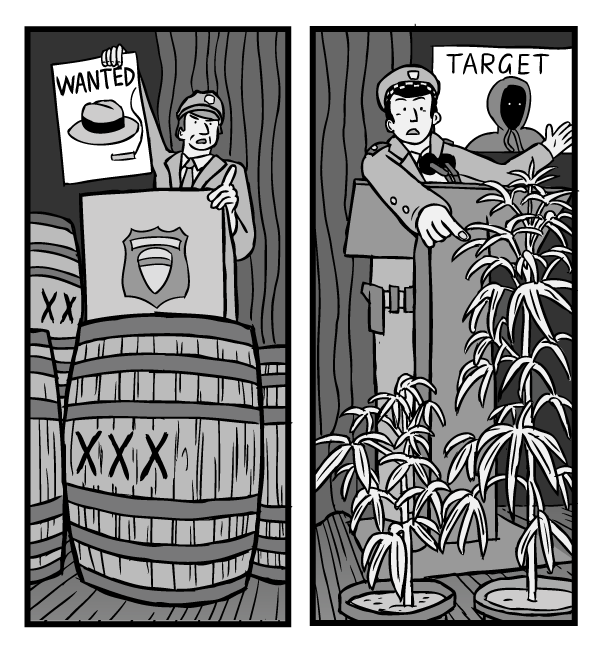
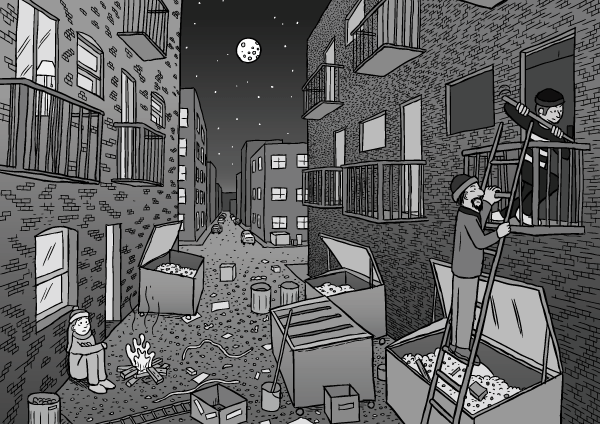
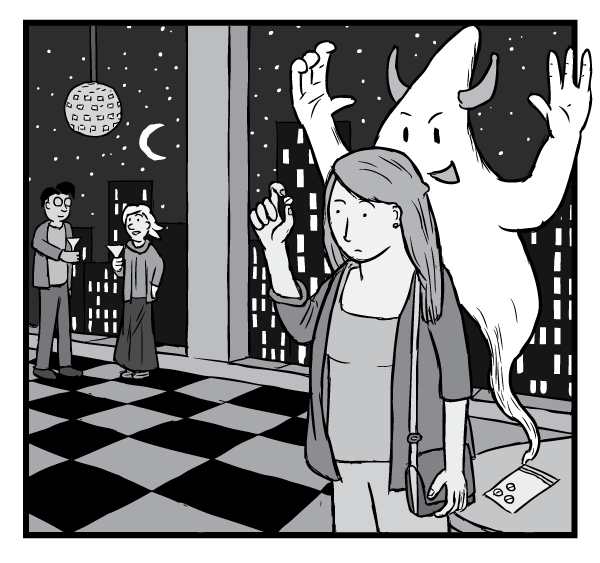
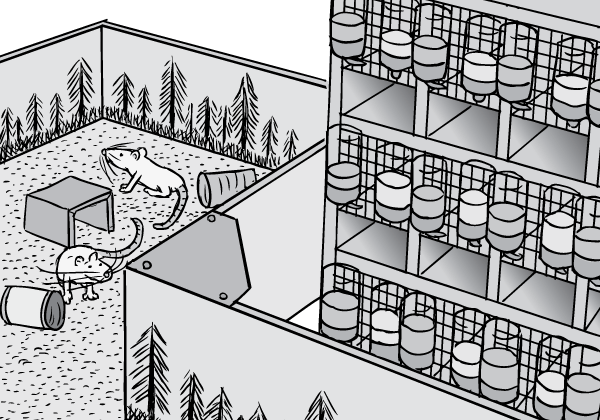


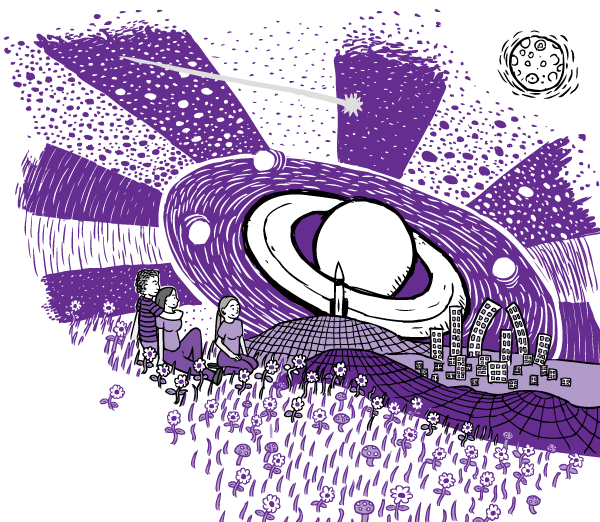
Comments
scott
Stuart, what a fabulous piece of work in these two cartoons and in the essay on your personal experience. I am inspired and heartened by it. I decided to pitch in here, as I am in recovery having been a heroin addict. My early recovery by necessity forced me into a very anti-drugs position and although I have a wider outlook now, at the time drugs were quite clearly the problem - it was helpful at that time for me to avoid them at all costs. Time has changed that and I now have more of an understanding of some of the wider reasons for my behaviour and also some of the consequences. I've been lucky enough to study this in more detail and look around the world at different approaches to both problem drug use and responsible drug use. It's now clear to me that the illegality of drugs and lack of regulation of drug supply are a direct cause of the physical effects and the criminal consequences I suffered. To be 100% clear, I have been in recovery for nearly 15 years now, which for me means I haven't used any drugs including alcohol in that time, I make this point to emphasise I do not advocate drug use, I do not take drugs, they do not work for me, however I believe I am not typical in this regard. I have no position on the issue of other peoples drug use, other than this: I hope it is not harmful and if it is harming them, I hope they can find help if they want it. To be equally clear, by harm I mean negative legal repurcussions, affecting their future prospects, health impact or psychological damage. During my time as a heroin addict I experienced stigma and righteous indignation from others. In the UK it is still believed that criminalising people is far more effective than offering them health interventions, sadly this is clearly not the case. The prison industry expands and treatment services are reduced. My experience is one of problematic drug use, it is not the norm. I have many friends who took part in my early experiments and did not become addicts, people who would otherwise be considered law abiding. My early drug experieneces were really enjoyable and not harmful either physically or psycholgically. I have to be believe that if drugs were not so taboo I might have got help when things started to go wrong for me, but due to a lack of education, ability to access help and sociteal shame on these matters I got worse an worse. I used some pretty crap drugs, which had been smuggled in to the country and I had no idea of the purity of what I was consuming. I used drugs in alleys, parks and disused buildings, as obsessed with avoiding detection as I was with relief from withdrawal symptoms. I injected drug solutions with water from anywhere I could find it, often in extremely unsanitary conditions. Needle exchanges were available in the UK at the time, but equally the police knew of their existence and would surveil the clinics, knowing that if you needed clean works, you had drugs in your possesion, so protecting your health and liberty at the same time became impossible. The work being done with safe consumption rooms and safe drugs gives me tremendous hope, particularly from my personal perspective of being seen as less significant or less worthy due to my drug use. The fact that human beings are being respected in this work blows me away. It seems possible that at some point in the future a human being's safety may be as important as whether or not they follow the societal rules. I write this with some hope that the future may get brighter, people are increasingly aware of the ambiguities of drug use and films such as 'The House I live In' and 'Anonymous People' are going some way to reducing the moral panic that the subject used to incite. Your comics have a great part to play in this and I appreciatte them.
big jim
To the Recovering Alcoholic that became offended. (1st June) You fool. You blinkered fool. I have probably spilt more than you have drank. I am also in recovery. Drink/drugs. I was also a professional drug/alcohol worker with 4 years counselling skills up until 2001 when a huge relapse took away my job,my partner,my home,my sanity,I have done 3 prison spells in the 80's which was addiction related. I have sadly lost up to 25-30 friends,family,colleagues to addiction since 1977 when I was 16 years old, I am now 53. I know sadly,i will lose more. I also have done many hrs voluntary work in the area for past 12 years. Inc service user groups,support groups,phone support,relapse awareness/life skills/1200 hours in local schools.classes etc. And lastly,have used the 12 step recovery programme for past 11 years. Now then. Your opinion is total biased in your OWN subjective experience. You do not show one ounce of 'gratitude' in your supposed 'recovery' like 100's I know that do. Forgive me if wrong,but you sound like a cowboy who jumped on a band wagon,never knowing how bloody hard a "day on the wagon" really is. You been here,there,up,down,got the t-shirt,and back again etc. You actually sound like someone who is using false passion to impress somebody to win favour or approval. Am I right? Or like a muslim who is offended that someone farted near their mosque. Please get real. You said in your post,that the last writer was glib! Thats not glib,its realistic! People have sought ways to alter state of consciousness for 2000 years or more! So your use of the term 'hedonistic' sounds...er...GLIB!! In a world of legal drugs,education,treatment,rehabilitation,yes some would still die. Thats realistic. But I wonder how many LESS would die compared to the pitiful situation we have now? Addiction,in my humble opinion is a mental,physical,spiritual illness. I bet your the kind of person who thinks anorexic's should just eat a sunday roast and get on with it! As you clearly have no empathy for the still suffering alcoholic/drug user. As for 'being there' I doubt it somehow. Society should not own my mind or body. MY MIND,MY BODY,MY CHOICE. IF ONLY WE HAD A 'INFORMED' CHOICE. Get it now? Namaste. Jim
Gust Sievert
Wow! Best article I read on the subject in years
La globalización de la adicción y el experimento del Parque de las Ratas | Observatorio Cannábico
[…] entenderse excelentemente y de modo resumido a través de Rat Park, el cómic elaborado por Stuart McMillen. Le da publicidad […]
Leon Fernandes
Hi Recovering Alcoholic, I'm sorry to hear about your situation and those of your friends. I have similarly struggled with addiction and have had to attend many tragic funerals of lives cut short by drug use and the environment in which it exists. However, I wonder if your experience would be different if drugs were legalised. Firstly, the amount of money freed up by removing it from policing, customs, imprisonment and other measures which are required to uphold current laws would be significant. Currently, between 80% and 93% of money provided to tackle the drug problem is allocated to policing, etc. Legalising (or at least decriminalising) drugs would free up a significant amount of money which would be allocated to education, treament, rehabilitation. This is the world I'd prefer to live in. Many people have died in car accidents (in fact, it's the highest killer of people aged between 15 and 55 in the Western world), however, our approach has not been to make cars illegal. We have instead put in measures such as seat belts, licensing and traffic laws to deal with our use of cars. There are grieving parents, siblings and freinds of people who've dies in traffic accidents. I hope this argument does not belittle your situation at all. As I mention, my life has contained similar tragedies, and what changed my opinion from being a strict prohibitionist to someone who believes that drugs should be legalised (though I'd still choose not to take them) is the experience of countries which have put steps towards legalisation (Switzerland, Portugal), as well as imagining how different my life would be if drugs were legal.
Recovering Alcoholic
I've used drugs in the past, too, and had occasionally enjoyable experiences. I also ruined my life with drugs and alcohol, including felony criminal charges for criminal activity when I was drunk. I've also been to plenty of funerals of people who overdosed on drugs, including a friend who drank himself to death at age 33. So I find your glib dismissal of the massive litany of tragedies that drugs and alcohol have brought into my life and the lives of people I care about as more than a little offensive. Go read the obituary section of the local newspaper, and go to the funeral of someone who died from alcohol-related causes or drug-related causes not pertaining to the illegality of drugs (people WILL still die from drugs when they eventually become legal, whether they're driving on them or simply abusing them to the point of death- the legalization or illegalization of drugs will not make them any safer) Why don't you tell the grieving mothers, siblings, and friends of the person who died that their problem is a massive blind spot preventing them from noticing how much fun it can be to get high? For someone trying to make a serious argument, you show a remarkable tendency to dismiss the opinions of others, often people as experienced as you (if not more so) in drug and alcohol use. I'm very glad for you that you've been able to drink and take drugs without suffering any adverse consequences, but if you're going to pretend that your hedonism should mean more to me than the deaths of people I care about or that I'm somehow being irrational because I think that their deaths mean something of social-policy significance in counterbalance to your arguments for the social-policy significance of your own hedonism, then I would suggest that you have a great deal more research to perform on this topic before you discuss it in public again.
War on Drugs prohibition comic - Stuart McMillen cartoons
[...] more information, read my blog post My Drug Period: lessons learnt from researching War on Drugs & Rat [...]
10,000 / 1,500 / 15: Breaking the Silence on Responsible Drug Use
[...] article is a sub-section of another article which discusses the messages of my comics War on Drugs and Rat [...]